JumpStart was an educational media franchise created for children, primarily consisting of educational games. The franchise began with independent developer Fanfare Software's 1994 video game JumpStart Kindergarten. The series was expanded into other age groups and beyond games to include workbooks, direct-to-video films, mobile apps, and other media under the ownership of Knowledge Adventure, which later assumed the name JumpStart Games.
The Learning Company (TLC) was an American educational software company founded in 1980 in Palo Alto, California and headquartered in Fremont, California. The company produced a grade-based line of learning software, edutainment games, and productivity tools. Its titles included the flagship series Reader Rabbit, for preschoolers through second graders, and The ClueFinders, for more advanced students. The company was also known for publishing licensed educational titles featuring characters such as Arthur, The Powerpuff Girls, SpongeBob SquarePants or Sesame Street.

The Blaster Learning System is an educational video game series created by Davidson & Associates and later published by JumpStart after the two companies were acquired and merged by CUC Software. The games primarily focused on mathematics, later expanding into language arts and science, and spawned an animated children’s television series in 1999 called Blaster's Universe.

The ClueFinders is an educational software series aimed at children aged 8–12 that features a group of mystery-solving teenagers. The series was created by The Learning Company as a counterpart to their Reader Rabbit series for older, elementary-aged students. The series has received praise for its balance of education and entertainment, resulting in numerous awards.

Nightmare Ned is a 1997 computer game for Microsoft Windows that was developed alongside the animated series of the same name. The game was based on a concept by Sue and Terry Shakespeare. It was released on October 7, 1997.
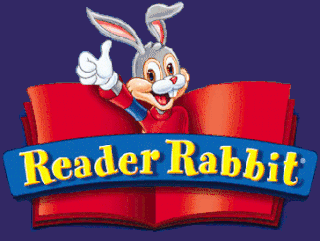
Reader Rabbit is an educational video game franchise created in 1984 by The Learning Company. The series is aimed at children from infancy to the age of nine. In 1998, a spiritual successor series called The ClueFinders was released for older students aged seven to twelve.
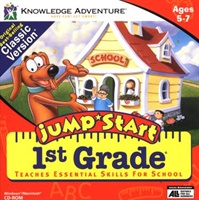
JumpStart 1st Grade is a personal computer game created by Knowledge Adventure in 1995 intended to teach a first grade curriculum. It was reissued in 1999 with new box art, was updated significantly in 2000, and was replaced with JumpStart Advanced 1st Grade in 2002, which was later replaced with JumpStart 3D Virtual World: Trouble in Town. The original 1995 version was the first appearance of Frankie, a brown, anthropomorphic dachshund dog who would go on to become the mascot of the JumpStart series.
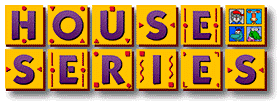
Early Learning House or simply the House Series is a collection of four main educational video games and two compilations for the Windows and Macintosh platforms, developed by Theatrix Interactive, Inc. and published by Edmark software. Each different game focuses on a particular major learning category with selectable skill settings for preschooler, kindergarten and elementary learners. Millie's Math House (1992) on mathematics, Bailey's Book House (1993) on language, Sammy's Science House (1994) on science, and Trudy's Time and Place House (1995) on history and geography. A spin-off, Stanley's Sticker Stories (1996), sees players create animated storybooks with the series' characters. Millie & Bailey Preschool and Millie & Bailey Kindergarten each contain the combined activities from two of the four software products. In addition the programs can be configured by an adult mode to suit students with special needs. Most of the activities in every game have two modes, one to allow learners to explore and try it out for themselves and the other for learners to follow specific tasks set by the game characters. Learners also have the option to print pictures of creative activities and record sounds in phonics activities. Later the games were re-developed by Houghton Mifflin Harcourt Learning Technology and re-published by The Learning Company with newer graphics and additional activities.
Madeline is a series of educational point-and-click adventure video games which were developed during the mid-1990s for Windows and Mac systems. The games are an extension of the Madeline series of children's books by Ludwig Bemelmans, which describe the adventures of a young French girl. The video-game series was produced concurrently with a TV series of the same name, with characters and voice actors from the show.
The Arthur video games franchise was a series of learning and interactive story video games based on the American-Canadian children's TV show Arthur. The games were released in the 1990s and 2000s for PlayStation and Game Boy Color alongside Windows and Mac OS computers.
Several video games based upon Blue's Clues, a children's educational television series by Nickelodeon, have been released, educational video games and web browser games based on the show. Most of the PC CD ROM-format titles were developed and published by Humongous Entertainment.

Disney Learning: Winnie the Pooh comprises three titles: Winnie The Pooh Toddler, Winnie the Pooh Preschool and Winnie The Pooh Kindergarten. They are point-and-click educational video games developed and published by Disney Interactive and based on the Winnie the Pooh franchise. The titles were shipped by BAM! Entertainment.
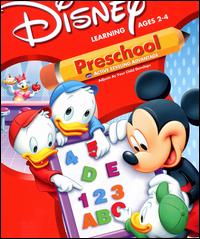
Mickey Mouse Toddler, Mickey Mouse Preschool, and Mickey Mouse Kindergarten are three sister educational video games by Disney Interactive. They are part of the Disney Learning Series, alongside similar Winnie the Pooh games, Mathquest With Aladdin, Reading Quest with Aladdin, Adventures in Typing with Timon and Pumbaa, Buzz Lightyear 1st and 2nd Grade, The Jungle Book 1st and 2nd Grade, Ready for Marth with Pooh, Phonics Quest, Search for the Secret Keys and Ready to Read with Pooh. Although not part of the series, the games Beauty and The Beast: Magical Ballroom and Ariel's Story Studio were frequently sold with the other games in promotional packages and advertised alongside them in trailers and commercials.
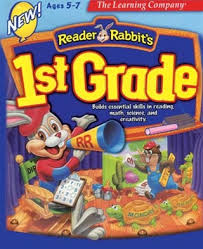
Reader Rabbit's 1st Grade is an educational video game, part of the Reader Rabbit series, developed by KnowWare and published by The Learning Company on January 14, 1998.

Math Rabbit is a spin-off of the Reader Rabbit educational video game series. It was published by The Learning Company in 1986 for MS-DOS and Apple II. A Deluxe version was released in 1993 for MS-DOS, Mac, and Windows 3.x. In 1997, a remake was released for Windows and Mac as Reader Rabbit's Math 1. The final remake for Windows and Macintosh was published 1998 is Reader Rabbit's Math Ages 4-6, with a personalized version released in 1999.

Thinkin' Things is a series of educational video games by the Edmark Corporation and released for Windows and Mac in the 1990s. Entries in the series include Thinkin' Things Collection 1 (Formerly Thinkin Things) (1993), Thinkin' Things Collection 2 (1994), Thinkin' Things Collection 3 (1995), the adventure game Thinkin' Things: Sky Island Mysteries (1998), Thinkin’ Things Galactic Brain Benders (1999), Thinkin' Things: All Around Frippletown (1999) and Thinkin' Things: Toony the Loon's Lagoon (1999).

Math Blaster! is a 1983 educational video game, and the first entry in the "Math Blaster" series within the Blaster Learning System created by Davidson & Associates. The game was developed by former educator Jan Davidson. It would be revised and ported to newer hardware and operating systems, with enhanced versions rebranded as Math Blaster Plus! (1987), followed by New Math Blaster Plus! (1990). A full redesign was done in 1993 as Math Blaster Episode I: In Search of Spot and again in 1996 as Mega Math Blaster.
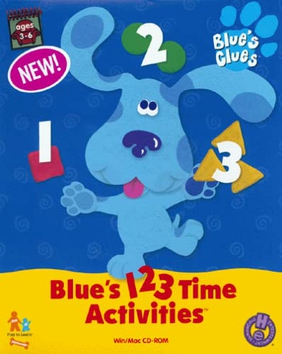
Blue's 123 Time Activities is a 1999 educational game developed and published by Humongous Entertainment. The game works on Windows 95 and above, and on System 7.5.3 to Mac OS X Tiger. It was the third game in the Blue's Clues video game series, in turn based on the television series of the same name.

JumpStart Preschool is a 1995 educational video game and third installment of the JumpStart franchise by Knowledge Adventure, after JumpStart Kindergarten (1994) and JumpStart 1st Grade (1995). It would later be re-released as JumpStart Preschool on August 26, 1998 and superseded by a new title JumpStart Advanced Preschool in 2002. It is also known as Jump Ahead Preschool in Europe.
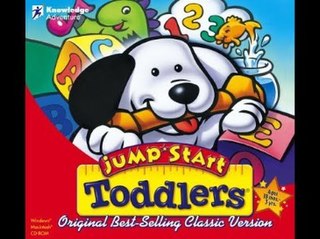
JumpStart Toddlers is a 1996 educational video game, the fourth within the JumpStart franchise. An enhanced version was released in 2000.















